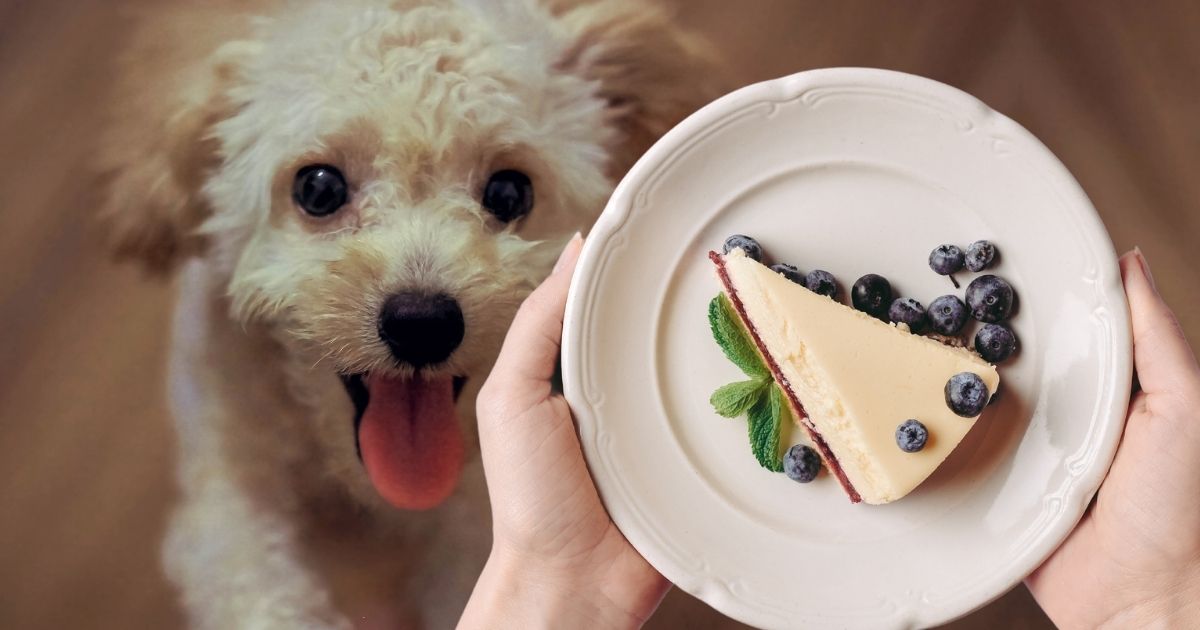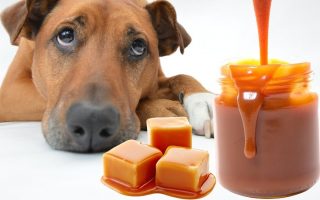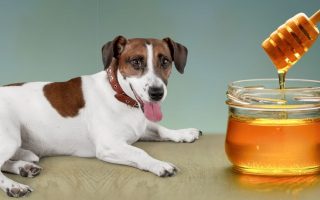Perhaps you have some cheesecake left from the other time when you had a craving.
Or, your dog is looking at you with large cute eyes while you’re indulging yourself eating cheesecake, and you’d like to share the treat with your pooch.
But can dogs eat cheesecake? Is it safe for your canine?
The short answer is YES! Your dog can occasionally have a taste of cheesecake in small quantities infrequently.
However, there are vital facts you need to know about feeding this delicious delight to your dog.
Cheesecake: An overview
Cheesecake typically contains the following ingredients: egg(s), sugar, cream cheese, vanilla extract, butter, and graham crackers (or whatever you want to use to make your crust).
Generally, dairy products are a NO-NO to feed your dog as they may have a nasty side effect on your doggy.
Although it is most popular in New York, cheesecake originated from ancient Greece.
It has since become widespread, with various adaptations and slight modifications.
For example, some people enjoy their cheesecake with Amarula liqueur, and some enjoy it with chocolate toppings.
How cheesecake is made is dependent on the preference of the maker.
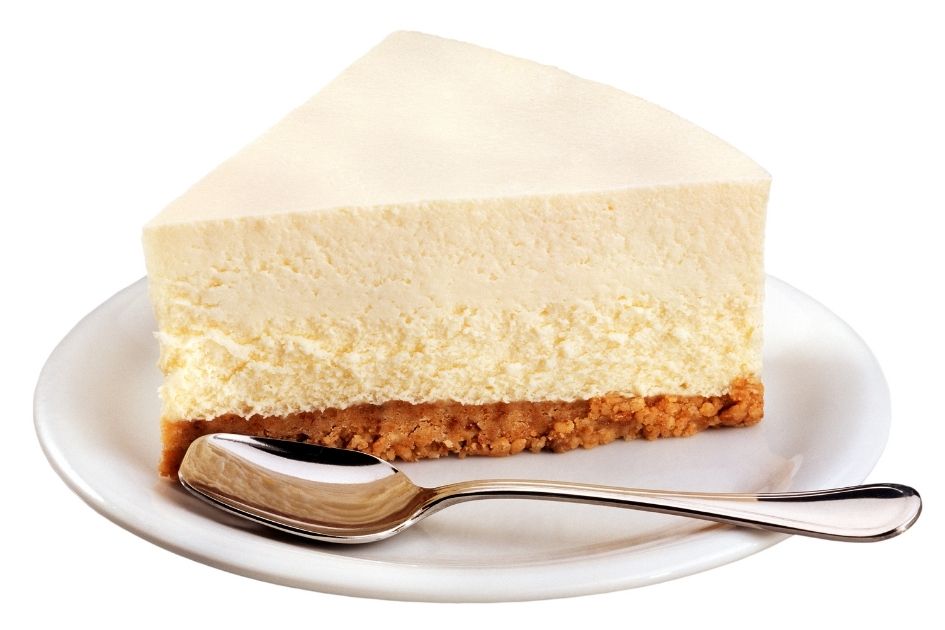
The nutritional value of a 100g cheesecake:
| Nutritional Info | Amount |
|---|---|
| Calories | 321 |
| Saturated fat | 10 g |
| Total Fat | 23 g |
| Cholesterol | 55 mg |
| Potassium | 90 mg |
| Sodium | 438 mg |
| Total Carbohydrate | 26 g |
| Sugar | 22 g |
| Dietary fiber | 0.4 g |
| Protein | 6 g |
Can Dogs Eat Cheesecake?
Yes, your dog can eat cheesecake in small quantities infrequently if it is lactose tolerant.
While it is okay for your lactose tolerant dog to have cheesecake as a treat, bear in mind that cheesecake is a treat that is high in dairy, fats, and sugar, all of which are very unhealthy for your pooch.
So, it is best to keep the treat to a very minimal level in an attempt to keep them safe from the adverse effects of having cheesecake in their system.
However, if your dog is lactose intolerant, please refrain from indulging it. It can end in a gruesome scene that includes digestive problems.
Can Dogs Eat Cheesecake Ice Cream?
Speaking of ice cream, dogs have digestive problems like nausea, vomiting, and diarrhea, amongst others, after having dairy products that ice cream contains in large quantities.
Therefore, you’re not advised to feed your dog any ice cream, much less cheesecake ice cream.
As for other flavors of ice cream that are healthy for your dog, here’s a short guide for feeding your dog ice cream.
Do not feed your dog chocolate ice cream (Or anything that contains chocolates)!
Dogs naturally can not stomach chocolates in any form, and it often leads to stomach issues that can be painful and make your nights long and sleepless.
Therefore, you are advised to refrain from feeding your dog anything that contains chocolate, even in small quantities.
Dogs can have plain vanilla ice cream.
If your dog must eat ice cream, plain vanilla ice cream is a good bet. However, remember that sugar isn’t at all healthy for the consumption of your dog, and ice creams are heavily laced with sugar.
Therefore, even the plain vanilla ice cream that we agree is a safer bet than most ice cream should only be fed to your dog in tiny quantities.
Do not feed your dog any ice cream that contains nuts.
While some nuts might be safe for your pet’s consumption, most nuts are toxic and can cause some nasty issues for its health.
To avoid problems, avoid nuts in general.
Is Cheesecake Crust Bad for Dogs?
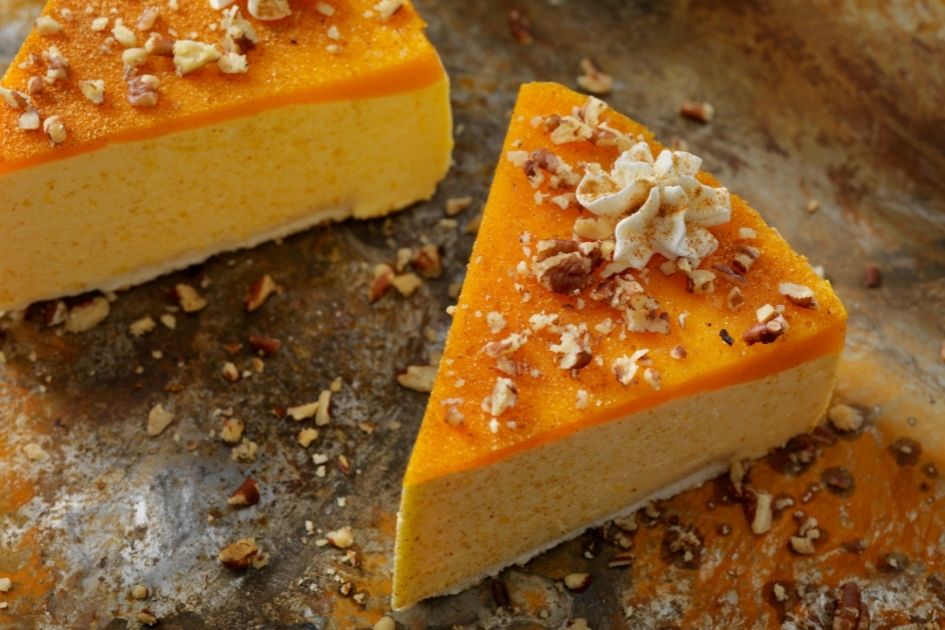
To answer this question, we must first know what the cheesecake crust contains.
The cheesecake crust can be made with graham crackers, cookies (various types can be used), different kinds of pastries, and just lots of other possible ingredients.
These items may be relatively safe on their own (not outrightly healthy).
Therefore, it is advised that if you must feed your dog cookies as a treat, good old dog biscuits are just fine.
They do not need the extra inconvenience that these items will cause them, and you do not need the additional stress and headache that the trip to the vets will cost you.
Can Dogs Eat Strawberry Cheesecake Ice Cream?
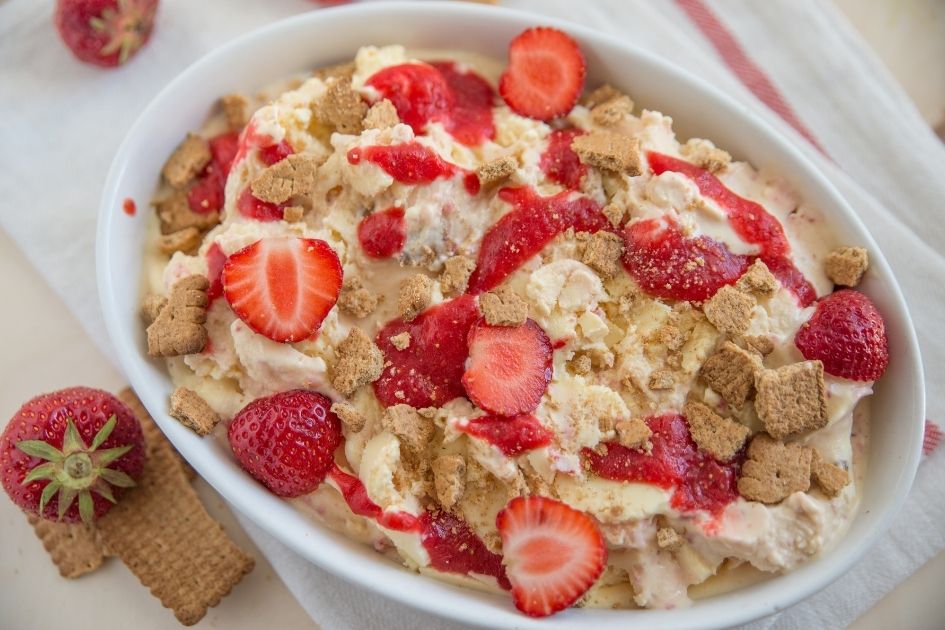
Now, if you were asking if dogs can have strawberries, that’s a different matter entirely.
Strawberry as fruit is safe for dogs, so you can go ahead and treat your dog to it.
Cheesecake as a dessert is also relatively safe (depending on your dog’s health status).
Sure, you can let your dog have it every once in a while for being an extra good dog.
However, always remember that strawberry cheesecake ice cream is high in fats, sugar, and dairy. If you ask us, we think your dog can do without it.
Can Dogs Eat Blueberry Cheesecake?
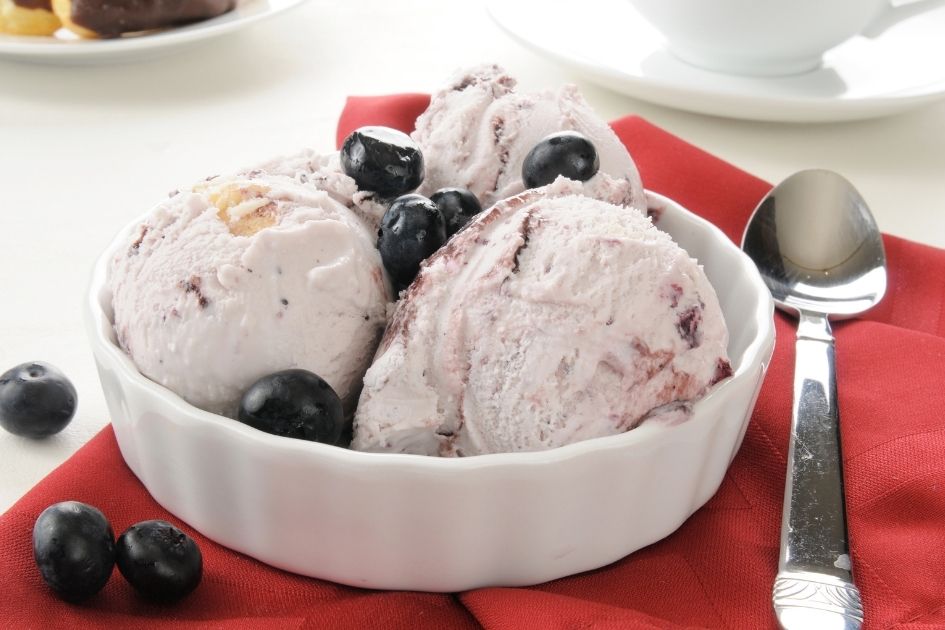
Blueberries are a great fruit option to feed your dog. It does not have harmful side effects on your dog like grapes and nuts, and it is a good treat.
However, since the topic of concern here is the blueberry cheesecake variant, we have to address it as that.
Yes, your dog can have blueberry cheesecake in small quantities if it is lactose tolerant.
Can Dogs Eat Human Cheesecake?
If you made yourself an excellent pan of cheesecake and you are wondering if you can let your dog have a taste of heaven, yes!
You can feed your dog human cheesecake. And if you can come up with a recipe especially for your dog, all the better.
You’ll be saving yourself and your pup a whole lot of trouble and eliminating or at least reducing the probability of your pet developing a digestive problem.
Advantages of Cheesecake to Dogs
- Cheese contains some vitamins that are important for the development of your dog.
These vitamins (vitamins A & B complex) will help your dog’s growth, and cheese is a good source for this.
- Cheese also contains calcium, which is an important variable that determines just how strong your dog will be. Calcium helps strengthen dog bones and teeth.
- Cheese can be a steady source of protein for your pooch. Yes, your dog probably gets enough protein from its meals, but a little extra can’t hurt.
Your dog will probably appreciate the variations in the protein sources.
Disadvantages of Cheesecake to Dogs
- It can contain ingredients that are toxic to dogs. If your cheesecake is coffee flavored or has any form of chocolate in it, you should have a rethink before serving it to your dog.
These items are not just unhealthy; they are regarded as toxic to dogs and can cause serious health issues for dogs that consume them.
- A lot of dogs are lactose intolerant. More often than not, you’ll find lactose intolerant dogs.
These dogs, just like people, can’t stomach the dairy products that cheesecake contains in abundance.
This is why you should think twice if your pooch is not lactose tolerant or you’re unsure about its health status. The cheesecake treat will likely last a few minutes at best.
However, these few minutes are capable of sending you to the vets and wasting your precious time.
How to Make Cheesecake for a Dog
For lactose tolerant pooches, you can proceed to make it a regular human cheesecake with the subtraction of any form of chocolate, any form of coffee, grapefruit, and any other items that might be toxic to dogs.
By eliminating these, your dog should be cleared to eat cheesecake without any form of casualty.
Remember to always be modest with the serving.
How to Serve Cheesecake to a Dog
If we agree that cheesecake should be a treat, then we must agree that cheesecake would be a simple treat to serve in a little quantity.
Share your toxin-free cheesecake with your dog, and it will be reminded that you’re the best and you can never do any wrong.
Can Dogs Eat Cream Cheese?
Yes! Cream cheese does not cause any harmful side effects in dogs (if your pooch is lactose tolerant). Cream cheese does not contain ingredients that might be toxic and may negatively affect your dog.
Does cream cheese give dogs diarrhea?
If your pooch is lactose intolerant, then yes, cream cheese can and will upset the stomach; therefore, altogether avoid cheese.
Can eating cheese hurt my dog?
Yes. Eating cheese can and will hurt a dog that is lactose intolerant. If you must feed your dog cheese, make sure the dog is lactose tolerant, and the ingredients are healthy for canine consumption.
Can cheesecake kill a dog?
Except your lactose intolerant dog goes a long time without treatment for the aftermath of eating cheesecake, death is an unlikely outcome.
Can dogs eat cake?
Yes. Your dog can eat cake if this cake does not contain the earlier mentioned toxic ingredients, which are chocolate, coffee, fruits like grapes, and nuts.
Also keep in mind that cakes may contain some dairy products, which are not suitable if your pooch is lactose intolerant.
Therefore you are advised to keep yourself updated with your dog’s health status and the cake’s ingredients.
Bottom Line: Can Dogs Have Cheesecake?
Yes! Your dog can eat cheesecake in small quantities as long as it is lactose tolerant.
If otherwise, you are advised to find a healthier snack variation and serve it with lots of love.
You May Like:
Can Dogs Eat Grits? Are Grits Safe For Dogs?

